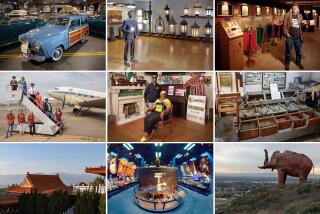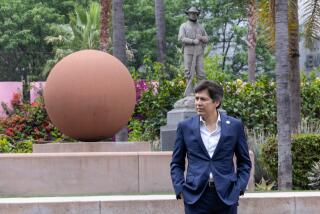Digging Up Your Roots : The Southern California Genealogical Society’s 24th annual Jamboree will be held this weekend at the Pasadena Center.
- Share via
While digging up her family tree’s roots, Jan Jennings of Glendale discovered the kind of skeletons that many others try to bury forever.
She says court documents revealed that the widow of her great-grandfather’s brother became a madam in Arkansas and gave birth after she had applied for her late husband’s pension--much to the consternation of relatives.
“Here were all these depositions from members of the family,” Jennings recalls, “going into great detail about how she was living in sin and how her daughters were living in sin.”
When a descendant of the madam inquired of Jennings about her research, she wrote to him: “I’m not sure you want to know about all of this.”
“Yes, I do,” he wrote back.
Jennings laughs as she recalls the story in almost a whisper, sitting in the Southern California Genealogical Society’s library in Burbank.
“I really think,” she says, “that people like to think of their families as a little bit more interesting than just plain old goody-goody two shoes.”
Such excursions aren’t unusual for a professional genealogist, which Jennings, 60, has been for a dozen years. She serves clients who may want to know if their forebears arrived on the Mayflower, descended from royalty or from someone else famous or infamous, or perhaps even participated in, as Jennings says, “a juicy scandal.”
Her work takes her to wills, probate cases, marriage and death certificates, property tax records and other documents that often gather dust in courthouses. She also scours files in libraries such as the Family History Library operated by the Mormon Church in Salt Lake City and 2,000 more affiliated research centers worldwide, including many in Southern California.
And she pores over U.S. census tracts, operates mechanical microfilm and microfiche readers (she has one of each at home) and activates her own genealogical on-line computer software--all in quest of obscure fragments of family histories feared lost, discarded or never recorded. (Birth records in California are off limits, Jennings says, because privacy laws protect them from being stolen or misused.)
Genealogy--described by Webster’s dictionary as “the science or study of family descent”--is an increasingly popular pastime that is said to rank with stamp and coin collecting and to appeal particularly to senior citizens who are living longer and looking back.
Its appeal--boosted by the 1977 ABC-TV series based on the late Alex Haley’s book, “Roots”--has grown so much that the nonprofit Southern California Genealogical Society’s 24th annual Jamboree, which Jennings has chaired for 11 years, will expand from one to two days Saturday and Sunday at the Pasadena Center.
With 200-plus exhibitors who can help trace family trees from Alabama and Bulgaria to the Ukraine and Wisconsin, as well as speakers on topics such as “Tracing Your Hispanic Heritage in the Americas” and “The American Probate System Step by Step,” the Jamboree is believed to be one of the nation’s largest such events and is expected to attract between 3,000 and 4,000 visitors.
A similar but smaller event--the Kin Dig, hosted by the Antelope Valley Genealogical Society, on May 8 at the Palmdale Senior Center--further attests to genealogy’s appeal.
“Some people will whisper to me, ‘How many direct ancestors do you have from Adam? I have five!’ ” Jennings says. “I say, ‘Sure, you do.’ ”
About the only people who can trace their heritage before 1525 are those with royal blood, Jennings says, adding that surnames hadn’t yet become common.
“It was just ‘John,’ ‘the son of John,’ or they had surnames that made them known for a physical trait, as in ‘John the limper,’ or for an occupation or where they lived,” she says. “Then the king of England said in effect, ‘All right, everybody start coming up with a name.’ ”
Much of genealogy’s appeal, Jennings says, stems from its reputation for often demanding an investigator’s tenacity and a frontier spirit.
“It’s the thrill of discovery,” she says. “It’s why Americans go into space, why we explore the unknown. Once we find out one piece, we can’t wait to go on to the next.
“You’ve got to keep going because you’ve got to find that guy’s father and mother. And then you’ve got to find the generation before theirs. What kind of work did they do? What were they like? Where did they come from?”
Genealogy hooked her “by osmosis,” Jennings says, after her father--who had been orphaned at age 4--waged a long, futile search for his family roots.
“My dad used to joke that we were probably standing on the shore when the Mayflower landed--meaning that we were Indians,” she says, adding that she has traced her father’s family to 1783. “I don’t know if I can absolutely prove it, but it’s almost certain that we have some Indian blood because he’s from Tennessee and Arkansas, and that was quite common in those days.”
The task of documenting one’s family history isn’t difficult, Jennings says, thanks to the Mormon Church, whose massive genealogical library in Salt Lake City she visits frequently, accompanied each September by a 40-member tour group that she organizes.
“The church has more than 100 film crews all over the world, microfilming records,” Jennings says. “The church will go into a county clerk’s office and say, ‘If you let us film your records, we’ll give you a microfilm copy of everything.’ ”
One of Jennings’ most ambitious efforts has helped Philo Van Wagoner, 77, a retired Los Angeles engineer, produce a bound volume family history in America dating as early as 1630, a decade after the Mayflower.
Actually, Van Wagoner says, he began his research as long ago as 1959 after his father’s funeral in Iowa. “We all sat down to dinner, and when everybody started talking about our ancestors, I said, ‘I better start right now,’ ” says Van Wagoner, a descendant of immigrants from the Netherlands.
“For the past 12 years,” he says, “Jan has been our chief investigator and compiler. In our book, nobody goes into aggrandizement. It’s just a listing of our history--nothing more than that.”
A trip by Jennings to the Mormon Church’s genealogical library in Salt Lake City has helped Richard Dowling, 49, a Montrose exhibit-media producer, trace his lineage to as long ago as 1682, partly through pre-Civil War documents in South Carolina and Georgia.
“I was very pleased with the work Jan did, especially when you consider that so many courthouses in the South burned to the ground during the war,” Dowling says. “What helped us were the church records. It’s astounding what actually did survive.”
But not every shred of family history that does survive can be believed, some genealogists point out, even as the Southern California Genealogical Society trumpets its own motto: “There is no truth without proof.”
Whenever she gives lectures, Jennings tells the story about a woman who asks a genealogist to research her family, only to learn that her grandfather had been executed in the electric chair at the Sing Sing penitentiary in New York.
At the woman’s insistence, Jennings says, the genealogist wrote that the grandfather “occupied the chair of applied electricity at one of America’s better-known institutions and was so dedicated to his work that he literally died in the harness.”
Where and When What: 24th annual Jamboree, hosted by Southern California Genealogical Society. Location: Pasadena Center, 300 E. Green St., Pasadena. Hours: 9 a.m. to 4 p.m., Saturday and Sunday. Price: $6 (one day), $10 (two days). Call: (818) 843-7247.
More to Read
Sign up for Essential California
The most important California stories and recommendations in your inbox every morning.
You may occasionally receive promotional content from the Los Angeles Times.










